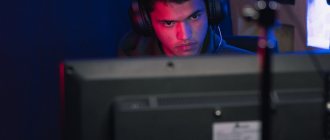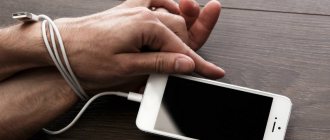With all the advantages that the Internet provides, it also reveals its negative sides, one of which is dependence on it. It would seem that there is nothing wrong with the user spending a lot of time here, but this opinion has recently been refuted by scientific research, experiments and observations made in everyday life.
What is Internet addiction?
Not so long ago, the statement that Internet addiction is a diagnosis of a disease would have caused a sarcastic smile or bewilderment, but today it has become a harsh reality. Moreover, this disease begins to acquire all the signs of an epidemic, as it spreads at tremendous speed and threatens to engulf countries and continents, turning their inhabitants into its obedient servants. Unfortunately, there are also frequent tragic cases associated with communication on the Internet through communities that are harmful to psycho-emotional and physical health. Teenagers are especially susceptible to the influence of online communities.
The influence of the Internet on children and adolescents: what is the problem?
The relevance of the problem of Internet addiction among teenagers was first thought about at the end of the 20th century. Today it is considered a full-fledged disease in South Korea, India, Japan, Australia and China. Internet addiction is accompanied by an obsessive desire to use the Internet and excessive use of it. American psychologist Ivan Goldberg first spoke about it. He argued that prolonged exposure to the Internet can cause a condition similar in its effect on the body to the effect of psychotropic drugs.
Internet addiction among young people is considered a serious problem. It provokes psychological disorders and neurological complications. When comparing the real and virtual worlds, the child gives preference to the second. This changes his thinking and behavior. Against the backdrop of teenage Internet addiction, relationships with other people deteriorate.
The following psychological symptoms of Internet addiction are identified:
- Negation. Accompanied by a lack of criticality towards one's problem. The child does not see anything wrong in being overly enthusiastic about the computer.
- Absistence. Characterized by a voluntary abandonment of everyday activities in real life in favor of the Internet.
- Tolerance. The child loses the sense of time when working at the computer.
- Compulsivity. It becomes difficult for the child to control his behavior. When he is unable to access the Internet, he develops aggressiveness and obsessive anxiety.
A child can understand the scale of the problem by learning what Internet addiction leads to. The consequences affect psychological and physiological health. His perception of the world changes and his health worsens. Children with this form of addiction develop tunnel syndrome, curvature of the spine and impaired vision.
Social complications of pathology include:
- simplifying the picture of the world;
- reduction in vocabulary;
- the formation of clip thinking based on the perception of information through short videos and vivid images;
- loss of ability to think logically.
Internet addiction among teenagers allows you to create a virtual image that does not correspond to reality. This gives freedom of expression. At the same time, the child loses interest in real life. He abandons his hobbies and moves away from friends. Subsequently, he has problems adapting to the team.
Types of Internet addiction
The World Wide Web has spread its networks widely, into which more and more new victims of its insidious temptations are caught, while the age of addicts is decreasing every year. The “Internet disease” has spread to such an extent that today experts have begun to identify types of Internet addiction, which have their own signs and consequences for those affected by this strange disease.
Where to get treatment for Internet addiction in St. Petersburg?
According to experts, in St. Petersburg, Moscow, and other large cities of the country, teenagers (and older people) get stuck online more often than residents of small towns, which is why the development of rehabilitation centers in these settlements is so important.
In St. Petersburg it is also quite possible to receive high-quality treatment for Internet addiction. Experts from the RC Development, the Veramed MC, the clinic of Professor F.F. Preobrazhensky and other institutions of this profile know well how to deal with Internet addiction.
Signs of Internet addiction
A person infected with the “Internet addiction virus” is very easy to recognize. As a rule, these people are completely immersed in virtual reality, so they are least interested in how they look in the eyes of others. They are not interested in the opinions of others, they are indifferent to comments, they do not react to scandals, from which they walk away, not paying attention to those who are next to them. Experts have identified the symptoms of Internet addiction:
- a constant increase in time spent on the Internet, reaching up to 24 hours;
- constantly checking email;
- increase in funds used to pay for the Internet.
Where to start treatment?
In order to get rid of this addiction, it is necessary to recognize its existence, otherwise all methods will be unsuccessful. The first step in treatment should be the following experiment: record the time you spent on the Internet during the day, and then count how much time you spent working and searching for really useful information. This is the time you should devote to the Internet during the day. Thanks to a strictly regulated norm, you will plan your day more rationally and make the most productive use of the time spent on the Internet.
You can also ask someone to block access to the site that you most often visit aimlessly. Or, which is a radical measure, turn off Internet access. Sometimes pets help fight addiction because they constantly require attention. This method is also suitable for those who spend a lot of time on the Internet due to loneliness.
If nothing helps you and Internet addiction progresses, you need to seek help from a psychotherapist or psychiatrist. Only a specialist will help you find out the reason for the development of addiction and suggest ways out of the current situation.
We also recommend reading the article about stuttering treatment.
Causes of Internet addiction
If addiction is already present, you can only get rid of it with the assistance of a specialist: treatment for Internet addiction will be required, while relatives and the “patient” himself must be aware of the importance of this process. But for treatment to be effective, it is necessary to identify the causes of Internet addiction. There are many of them, and most of them have deep origins:
- self-doubt inherent in overly demanding parents who wanted to see their child “the very best”, who did not live up to their hopes;
- difficulty communicating due to personality traits or health conditions;
- extreme dissatisfaction with your real life;
- lack of contact and understanding within the family;
- bad habits and addictions, condemned by family and friends.
Is it possible to get quality treatment for Internet addiction in Moscow?
Nowadays, Internet addiction treatment is provided by a number of Moscow rehabilitation centers. The average duration of treatment for Internet addiction in the Russian Federation, according to experts, is about a month, however, there are relatively few requests for such a problem, since not everyone realizes the presence of excessive attraction or notices it too late.
When a patient goes to a rehabilitation center, he is first examined for addiction to the global web and what is associated with it (network games, online shopping, etc.). After this, if a person is recognized as sick, he is prescribed treatment (on average it takes from 10 days to a month). The program can be based on drug therapy (for concomitant nervous disorders), acupuncture, active sports, etc.
In Moscow, such centers as a branch of the international network of Renaissance clinics, the Marshak clinic, “DAR” and others are working to get rid of Internet addiction.
Internet addiction in teenagers
One of the most common and difficult to treat is Internet addiction among teenagers. Analysis of the reasons leading to adolescents’ addiction to the Internet, most often, lies in interpersonal relationships in the family and peer community. Often, parents themselves push their young child towards “Internet disease.” A gift in the form of a computer, tablet, laptop or iPhone is the first step into virtual reality, the doors to which are opened slightly by loved ones.
And if at first it all starts with seemingly harmless games that captivate with their graphics and special effects, then over time the range of interests of growing children expands. Most often, parents are not allowed to enter their virtual world. Internet addiction among teenagers arises in different ways:
- lack of attention and love from parents;
- fears and phobias formed against the background of low self-esteem that arose as a result of communication with classmates, peers living in the neighborhood;
- the desire to find understanding, love, sympathy;
- the desire to meet unusual people, to fill your life with extraordinary actions, often at odds with generally accepted morality.
Stages of development of Internet addiction
Like many psychological attachments, experts distinguish three stages in the formation of a stable attachment:
- First, a person develops a strong interest in a certain object. A computer game, characters from TV series and films, famous people, or another option gradually absorbs attention and free time. At the first stage, a person still tries to lead a social life, work or study, but as the illness progresses, this desire decreases.
- The second stage is characterized by a sharp increase in addiction. In the absence of access to the network or the inability to immediately track events occurring with the object of addiction, hysteria or severe depression begins. The need to engage in any activity is perceived as an obstacle to digital happiness.
- The third stage is extinction. The network continues to take up every free minute, but the object of addiction is only of temporary interest. If events that differ from the standard occur, they are discussed or carefully examined, but then the intensity subsides. Neither real nor online life brings joy, depression and suicidal tendencies appear.
The result will be a constant feeling of deep depression, from which it is impossible to get out of it on your own.
What does Internet addiction lead to?
Traveling for many hours to different sites and communities has a detrimental effect on the physical and mental state of the addict. The longer he is in the web, the more difficult it is for him to distinguish reality from the virtual state. The craving for another life on the Internet does not pass without a trace for any person, but for everyone the consequences of Internet addiction look different:
- sloppiness, lack of attention not only to one’s appearance, but even to personal hygiene;
- emphasized indifference to the opinions of relatives and friends, their problems and requests, household affairs;
- increased aggression, especially if relatives try to prohibit or reduce time spent communicating with the computer;
- narrowing the circle of real acquaintances, refusing to communicate with them.
In addition to psychological withdrawal from real life, Internet addiction also leads to impairments in the physical health of the patient. Most often, there is decreased vision, visual fatigue, pain in the eyes, dryness, and later visual acuity drops sharply. However, health problems are not limited to these; some others are added:
- decreased immunity;
- insomnia;
- recurring headaches;
- increasing back pain.
Internet addiction and loneliness
Surprisingly, loneliness can be both a cause and a consequence of Internet addiction. In the first case, the feeling of rejection, persecution, persecution by relatives or peers gives rise to the desire to hide, to find those who will understand and accept the person for who he is. In this situation, a forced refusal to communicate with real people and Internet addiction becomes a salvation from bullying and despair caused by humiliation, dislike and inattention.
In another case, loneliness becomes a consequence of the user’s withdrawal from reality: he is absorbed in virtual life, with friends and acquaintances he becomes uninterested - they do not understand and do not support his lifestyle and conversations, which relate only to the Internet. The problem of Internet addiction in both cases comes into full swing here, because a person is increasingly disconnected from existing realities and immersed in a world of fantasy and the life he has invented.
February 22, 2017
Irina Salnikova Journalist, author of the blog “No Bullshit in the Head”, mother of two cartoons - a daughter and a son. I live easily, I am inspired by my dreams, I believe in myself. I value sincerity and a sense of humor in people.
- bezfigni.blogspot.ru
- facebook.com/profile.php?id=100012517327054
If someone had told me ten months ago that I would get rid of the habit of “hanging out” on the Internet, I would never have believed it. It seems that it was written on my forehead then that I was an Internet addict. I spent hours monitoring news feeds, indiscriminately surfing websites and blogs, and hanging out on video channels. And now I don’t read news on the Internet. At all. And I even check my Facebook profile at most once a day, and sometimes every other day.
I walked towards this reality through “I can’t” and “I must.” I lost my temper, was mistaken, deceived and beat myself up. But now, with almost a year of struggle for personal freedom under my belt, I can definitely say: anything is possible! Even freedom from Internet addiction.
The Omniscient Internet states that Internet addiction is a disorder that has physical and mental symptoms. However, it is not yet a disease according to medical criteria. I would argue with the last statement. From my own experience, I will say that Internet addiction is a real illness, like alcoholism or drug addiction. Moreover, I am sure that soon it will be included in the classification of diseases and will be treated. Perhaps they will even invent a vaccine. What if all this already exists? Alas... Judging by the number of people everywhere and around the clock focused exclusively on web surfing, there is no vaccine yet.
Of all the happy wi-fi users with their noses buried in mobile phones and tablets, some are, of course, busy. Well, or at least reading a book. The rest are killing time. They sit on social networks, chat, play games, watch movies, click on links, without remembering what they read. And the worst thing is that almost none of them will clearly answer the questions: “Why do you need this? How do you benefit?”
I also had this habit of surfing the Internet aimlessly. I went to one site, followed the link to another, then found myself on the twenty-fifth... Sometimes, regaining consciousness in the midst of web surfing, I admitted to myself that I couldn’t remember why I ended up on this particular resource and what exactly was there for me , need to. And at this time, life was in full swing offline: the soup on the stove was running away, the child was asking to play with it for an hour, an unread book was gathering dust, my mother was waiting for my call...
I was most addicted to the news. I was deceived by the firm conviction that I needed to read the news “for work.” Although my main job at that time was my newborn son, and the need for detailed monitoring of the information picture of the day was a thing of the past, I still disappeared on news sites. When I woke up, the first thing I did was check the popular news feed. During the day, I opened the news every half hour to follow how the events of a particular news story were developing. In the evenings, stealing time from sleep, she did not change her custom and greedily read everything that pleased or saddened the inhabitants of the Earth the past day.
“But I always have something to discuss with my husband at dinner,” I wrote myself a dubious bonus. Well, by God, you can’t talk to him about baby poop! It’s as if I forgot that before we always found topics for conversation without any problems.
The worst thing is that in the depths of my soul I realized the disastrous nature of what was happening. It was difficult not to notice the intermediate results of addiction - laziness, procrastination, stagnation. Under their oppression, I successfully buried my dreams and plans. I didn’t write it myself, but read other texts. She did not create her own reality, but immersed herself in someone else’s. A sort of modern version of Oblomov with the Internet instead of a sofa. The obvious senselessness of the protracted killing of time was even more depressing.
What really new did I learn from the message about Angelina Jolie's breasts? How is the news about bombings in Syria useful for my reality? What did information about intrigues in the elections of a foreign president change in my life? Nothing. I filled the void with emptiness and only fell asleep more deeply. Like Oblomov.
And I would still be asleep, but it turned out like the saying goes. There would be no happiness, but misfortune would help. One day, while having breakfast and, as usual, reading the news, I unsuccessfully reached out for a mug. A moment later, the laptop keyboard was filled with fragrant cocoa. While I was liquidating the consequences of the accident and coming up with excuses for my husband, whose laptop I had ruined, it suddenly dawned on me. It became obvious that I was seriously damaged in my mind, since I couldn’t even eat without news accompaniment. “Irina, we need to do something!” — a desperate cry broke out from somewhere in the depths of consciousness.
Now I know what that scream was. It was my brain, completely zombified by Internet news, that nevertheless found reserves to protect itself from... me. I am seriously convinced that it was no coincidence that he sent the wrong command to his hand.
This incident began my great exodus from empty news into the Internet void. I called it the thorny path of sincere confessions to myself.
First confession: I have an Internet addiction
I literally stood in front of the mirror and, looking into the eyes of the reflection, repented. I admitted that I suffer from that type of Internet addiction that prompts me to endlessly search for information on the Internet. I didn’t play online games, didn’t register on dating sites, didn’t argue on forums or chat in chat rooms, didn’t participate in online auctions. But she overloaded herself with information, endlessly reading the news. I had to admit that this habit pleases my ego, supposedly lifting me to the crest of an information wave and giving me the illusion of knowing everything. Web surfing also replaced my lack of communication: after all, maternity leave has its own characteristics and limitations in terms of communication.
Second Confession: Addiction took a toll on me.
And we're not talking about laptop repair costs here. The main damage was caused to my psychological health, wounded by the context of the news. Traditionally, it is 90% negative. Increased anxiety, moral devastation, insomnia - I carried this ballast in addition to my unhealthy hobby. Irreversible damage was done to the time allotted to me: while I was online, life passed me by. How many of its important moments are missed? What did I deprive myself of to satisfy the inner monster that feeds on Internet news?
Third confession: you won’t be able to get rid of Internet bondage right away
The surprises began as soon as I decided “from tomorrow morning” to read the news once a day! And although you can’t breathe before you die, the evening before my renunciation I surfed with renewed energy. A week has passed. I noticed that “one time” turns into an infinite number. So I look at the news during the day while the child is sleeping. In the evening, I again look with one eye at “what is happening in the world.” Waking up in the morning, I decide that the sanctioned “once” has come now. So I slipped into the previous mode of Internet wakefulness, “in the middle of a noisy ball by chance” finding myself reading the news.
After several such attempts, I realized with horror that it would not be possible to get rid of Internet addiction through half measures. The patient in my face clearly needed a scalpel and amputation, and not a band-aid with “green stuff”. And I decided! I made up my mind the way steamed bathhouse attendants jump into a fluffy snowdrift. Without looking back or doubting. Because if you start to doubt, you will never jump. My “answer to Chamberlain” was as follows: from now on, I will stop reading news on the Internet altogether! Another promise became insurance against failure: I will not only stop reading the news, but I will stop using the Internet altogether! I set a period of one month for the habit to form.
Confession 4: Leaving your comfort zone is scary.
As soon as I made the choice to completely cut myself off from the World Wide Web, fear set in. He whispered that voluntarily losing the Internet in the age of spaceships and robotic vacuum cleaners is the culmination of madness. Fear scared me: you’ll miss all the trends. Fear asked: what will you do with your free time? Fear persuaded: open the browser, no one will find out. When the inner traitor realized that I was not joking, he began calling me names. He mocked my integrity, my reluctance to break my word.
My withdrawal, excuse the drug addict slang, was terrible. The Internet was not enough physically and mentally. I confess, during the first month I almost failed the mission ten times. And I would have failed if my husband had not supported me. He was enthusiastic about the “experiment”, listened sympathetically to my confessions on the topic, and praised me for every new day without the network. And I even looked for the necessary phone numbers on the Internet if I needed to call somewhere. Once again, I was convinced that close and dear people are our fortress, before which the most fierce enemy retreats.
Fifth confession: fear is replaced by liberation
About a month later I suddenly felt better. The network was released. It turned out to be an amazing feeling: not only did I not know what was going on in the world, but I also didn’t lose anything from it. The news disappeared from my reality, and with it worries, empty talk and worries about someone else’s life. And yes, I kept up with life, because news began to come to me in a different way. I’ll accidentally hear something on the radio, something my husband will tell me, something my friends will tell me.
It turned out that I now have an ocean of free time, the lack of which I used to love to complain about. I started reading a lot again, walking, going to the gym, and spending more time with my children. Insomnia and anxiety disappeared. In a month, I managed to redo things that had been waiting in the wings for years - I sorted out digital photo archives and printed the necessary photographs, for example. She also immersed herself in her own creativity and began writing a book. My soul blossomed petal by petal, like an indoor flower that was suddenly taken out of a musty room into the fresh air.
Sixth confession: having passed the test, be on alert - the enemy is not asleep!
At the beginning of April, it will be exactly one year since I chose freedom from online news. Of course, I didn’t take this good initiative to the point of absurdity and deprived myself of the pleasure of becoming an Internet hermit. I don't like extremes. But even if I did that, you wouldn’t be reading this text.
However, you have to be completely honest. Halfway through the recovery process, I had another breakdown. It did not concern Internet news itself, but was associated with activity on the social network. I started a blog and to promote it I decided to get a Facebook profile. Before this, I hadn’t used social networks for eight years. And as you probably already guessed, Facebook almost pulled me into the Internet quagmire again. When I realized that it was eating up my time just like the news before, I simply deleted the mobile application from my phone. After the experience of refusing news, it was much easier for me to do this. Now I appear on Facebook only when necessary: to post a link to my blog or a new article, to take part in online courses, to like a heart-warming post from my friend’s feed.
I like my day today. I'm happy and free. I am sure that I will not fall apart and will continue to live here and now without the “leash” of the Internet. I almost forgot what it’s like when the “leash” tightens and forces me to run where I don’t want to go. What is your relationship with the Internet? Do you have the illusion that you are in control of yourself? Or have you already realized that you are losing the battle of the network, as I once realized?
Self-development #Internet #Awareness #social networks
How to get rid of Internet addiction?
Life in our fast-paced age, changing daily, full of temptations, deception, lies and bombarding people with streams of information, sometimes unnecessary and even harmful, has turned out to be too difficult a test for many. In addition, the exact name given to the Internet: “World Wide Web” - fully justifies the actions of the owners of websites and social networks.
They not only offer information necessary for work and life, which can be used if necessary. Like spiders, they drag into their webs those who are weak in spirit, who have not found their place in life, who are looking for friends, like-minded people and lovers of adventure and thrills. It is not without reason that experts unanimously assert that Internet addiction is a problem in modern society.
The ways to get rid of it largely depend on the degree of neglect of the disease, the desire to get rid of it and the correct treatment. And it may contain various methods and techniques, including those that seem, at first glance, if not absurd, then ineffective, but together they will all give a positive result. You can start with the simplest and most understandable:
- plan your day every day, devoting a minimum of time to working on the Internet;
- remember your family and friends and take time to help them and visit them if they do not live nearby;
- Introduce sports into your life and visit a fitness club, swimming pool, gym, and work in the fresh air.
Step-by-step instructions on how to deal with Internet addiction
Don't know where to start? Then explore these few simple tips you can implement today. The best way to combat computer addiction is to start with small, simple steps in assessing and changing habits and learning to lead a balanced life.
Evaluate your habits
First, think about what fascinates you most on the Internet? Why do you lose track of time? To do this, for several days, keep with you a pen/pencil and a convenient small piece of paper, divided into sections: social networks, YouTube, Instagram, searching and reading information.
Record any of your movements on the Internet in it, placing a mark next to these things on a piece of paper. This will help you understand what you are dealing with.
Train yourself to take a short break
Addiction is something we often do automatically without thinking. Therefore, after identifying your habits, you should try to break this chain: desire-habit-automatic action , inserting a short pause between them. For example, when you feel like playing on the Internet, just stop for a few seconds.
During this pause, ask yourself: “Have I thought so many times how to get rid of gambling addiction? Do I really want to sit down and play again and is this habit stronger than me? Even if after this you still give in to your desire, since the Internet has tied you with a chain, the important thing is that there was already some small pause in your automatic actions.
Every hour a short break
Even if you're stuck on sites you're addicted to, try to take a two-minute break once an hour. Set a reminder on your computer to remind you every hour to take a break. As soon as the reminder pops up, get up from your desk and walk for 5-10 minutes instead of two.
Do some push-ups or squats. You can even do a short cleaning of your room or work area. Talk to someone in person. Drink some water and eat fruit.
Returning to your computer, try closing the open browser (not minimizing it, but closing it) and do something unrelated to it before returning to the Internet. For example, draw some kind of graph or create a table in XML, draw a picture in Photoshop. It will be difficult at first, but over time it will become easier and the duration of the breaks will increase.
Changing habits
When it comes to how to get rid of computer addiction, an important step is for a person to completely change his habits. It may take you a month, two, or maybe more to completely change your Internet addiction habit, but it’s worth it. Because any change made halfway will not last long.
Start with the biggest trigger. So, you have identified your habits and learned to take short breaks, as recommended above. Now it’s important to know your most common triggers—the things that cause you to “hide and escape” on the Internet. These could be conflicts in the workplace, fatigue, stress, family quarrels, reluctance to do homework, boredom, secret passions.
Whatever your triggers, choose the one that most often motivates you to go online. If there are several of them, simply choose one of them by lot.
Choose a replacement
Think about what is the best way to replace checking email, social networks, computer games or wandering around the world wide web in search of any information? Choose something positive and fun that you can do in 5 minutes whenever your chosen trigger hits you.
This could be audio listening to several pages of a novel, keeping a personal diary, playing sports, walking, drawing cartoons, reading jokes, or practicing learning a foreign language. The subsequent fight against Internet addiction will be effective only when you learn to replace the trigger that happens to you with your chosen activity every time. This will help break the chain of addiction.
Replacing an old habit with a new one
Perform a new habit every time after the trigger occurs. Do not allow any exceptions, otherwise it is unlikely that you will be able to create a positive habit. A new habit forms much faster and stronger if it is done consistently immediately after the trigger. To be inconsistent and continue to hesitate to change is to allow an old habit to remain in place.
Even if you fail a few times, that doesn't mean you should give up - just start again and try to be more consistent. Figure out why you failed and plan to overcome that obstacle. At the same time, set a rule for yourself - no exceptions, no matter how much you want it!
(By the way, we advise you to find out what types of Internet addiction can both an adult and a teenager get into?)
Learn to live a balanced life
Ultimately, it's good to have an idea of what life would be like without internet addiction having the power to control you. What will be your success at work and school? What will you look like if you don't constantly surf the Internet? How much will your health and appearance improve? But for this you need to understand and do something.
Try to understand the correct purpose of your actions
The goal is not to eliminate all sources of information and be disconnected from the online world. This doesn't mean throwing away your iPhone, tablet, or laptop. These tools are incredibly useful and even necessary (some people make a living using them). They have many positive aspects.
But when it comes to how to overcome Internet addiction, it is important not to let these sources of information control your life and not turn yourself into a skeleton sitting in front of the monitor. On the contrary, lead a life in which there is enough useful time for other activities.
Make a schedule
Plan a list of things to do that are not related to the Internet. This will help you reserve time for these activities. For example, you want to exercise, set aside some time during the week to exercise (even 30 minutes 3 times a week). Include time in your schedule for guests, for walks alone, for some hobbies: fishing, sports, a bath with friends - whatever you see fit.
Work without distractions
Every morning, identify 1-3 important things you are going to do that day.
- Do the first thing before you dive into email or internet games, surfing.
- When starting the second important task for today, close your Internet browser (if you can). As a last resort, ask someone at home to turn off the router and leave it turned off for an hour.
- Before your third scheduled task, turn off all notifications on your computer and mobile device. Close everything except what you need to complete your task.
There is at least one explanation for all these actions : you must learn to focus on completing a specific task if you want to get rid of Internet addiction and fight it.
Limit your time on the Internet
Schedule (short) time with your sources of information. Think about how often you want to check your email and your social media pages (or other sites)? Choose a time and schedule to use these tools in your life, also setting a limit of twice a day for only 15 minutes per session.
This limit allows for efficient use of limited time. Encouraging you to decide what is important to do on the Internet within this time, and not wander aimlessly around the World Wide Web.
Choose your sources wisely
Eliminate all sources of information, leaving only those that you cannot do without. Sometimes we use these things just because everyone else has them. Or because today it is popular to have a page on Instagram, Facebook or VKontakte, but at the same time they do not improve or make our lives easier.
For example, some deleted their accounts from Odnoklassniki, and did not look at their pages on Facebook, Instagram or VKontakte for more than a year. Their life goes on!
You can do this to save yourself from endlessly looking at things that are not very important. Or you can choose to bookmark only 10 really good blogs, rather than 50 that once caught your attention. Your time and attention are priceless, so you should only spend them on things that truly make your life better.
Make sleep a priority
Lack of rest makes us less able to concentrate, which means we deviate from planned self-control more quickly and easily. According to some studies, it also makes us more susceptible to the Internet.
How to get rid of Internet addiction - advice from a psychologist
Psychologists who are familiar with the problem of Internet addiction first-hand claim that it is not fatal, and with some effort on the part of the person suffering from this disease, his relatives, friends and specialists, one can get rid of it or, at least, reduce its harmful personality-destroying influence . They advise how to overcome Internet addiction:
- correctly identify the cause of the disease;
- limit your time on the Internet;
- stop using the Internet to read books that are available in print;
- attend consultations on behavior correction, and then psychotherapy sessions with a specialist.
Phone and Internet addiction: how to get rid of it yourself?
To overcome Internet addiction , to understand how to effectively get rid of it on your own, you first need to admit that there is a problem . The second step you need to take is to return to real life, forgetting about the Internet for a few days completely. Dedicate the free time to communicating with friends and family, go out into nature with them, go to various events (cinema, museum, concerts). You can also play sports or read an interesting book.
If you cannot imagine your life without the Internet , then at first try to limit the time spent on the Internet . If your addiction manifests itself in the form of constantly checking email without much need, then experts advise setting specific hours for just this purpose. Follow this schedule strictly and gradually your desire to always check your email will disappear.
The main thing to always remember is strict self-control. It is he who helps to cope with the uncontrollable desire to be online all the time. Thanks to him, you are able to return to a full real life.
Internet addiction - interesting facts
- Internet addiction shortens our lives, the facts about which say that social networks “eat up” the most time, where people spend an average of 3 to 5 hours.
- Australia surpassed everyone in this “competition”, where users spend an average of 7 hours online.
- They say that people with low self-esteem spend the longest time on social networks; Among them are the largest number of suicides.
- The performance of schoolchildren who spend more than two hours on the Internet decreases by 20%. Something to think about!
Internet addiction test
If you suspect that you or a loved one have this problem, you can take a psychological test for Internet addiction, which will allow you to understand how serious the problem is.
The authors of the test are psychologists L. N. Yuryeva and T. Yu. Bolbot (4).
| Statement | Never | Rarely | Often | Often |
| 1. How often do you feel exhilaration, pleasure, satisfaction or relief while at the computer (online)? | ||||
| 2. How often do you look forward to being at the computer (online), thinking and reflecting on how you will find yourself at the computer, open a certain site, find certain information, make new acquaintances? | ||||
| 3. How often do you need to spend more and more time on the computer (online) or spend more and more money in order to get the same sensations? | ||||
| 4. How often do you manage to stop working at the computer (online) on your own? | ||||
| 5. How often do you feel nervous, depressed, irritable, or empty when away from your computer (offline)? | ||||
| 6. How often do you feel the need to return to the computer (online) to improve your mood or escape from life’s problems? | ||||
| 7. How often do you neglect family, social responsibilities and studies due to frequent work on the computer (being on the Internet)? | ||||
| 8. How often do you have to lie or hide from your parents or teachers the amount of time you spend on the computer (online)? | ||||
| 9. How often is there an actualization or threat of loss of friendships and/or family relationships, changes in financial stability, academic success due to frequent work on the computer (staying on the Internet)? | ||||
| 10. How often do you notice physical symptoms, such as: numbness and pain in the hand, back pain, dry eyes, headaches; neglect of personal hygiene, eating near the computer? | ||||
| 11. How often do you notice sleep disturbances or changes in sleep patterns due to frequent work at the computer (online)? |
How to count points correctly:
- “never” - 1 point;
- “rarely” - 2 points;
- “often” – 3 points
- “very often” – 4 points.
Results:
- If the sum of points is less than 16, then the risk of developing Internet addiction is “0”.
- From 16 to 22 points - the stage of infatuation or “sticking”. A person is still able to control the time he spends on the Internet, assesses himself realistically, but is already at risk of developing Internet addiction.
- From 23 to 37 points - the first stage of addiction. Rehabilitation measures are recommended. It is difficult for a person to control time on the Internet.
- 38 or more points is the second stage of addiction. Rehabilitation measures are necessary. The user is unable to objectively assess the harm that addiction brings and does not control the time and nature of being online. A harmful addiction to the Internet destroys your personal life, relationships, and work.











